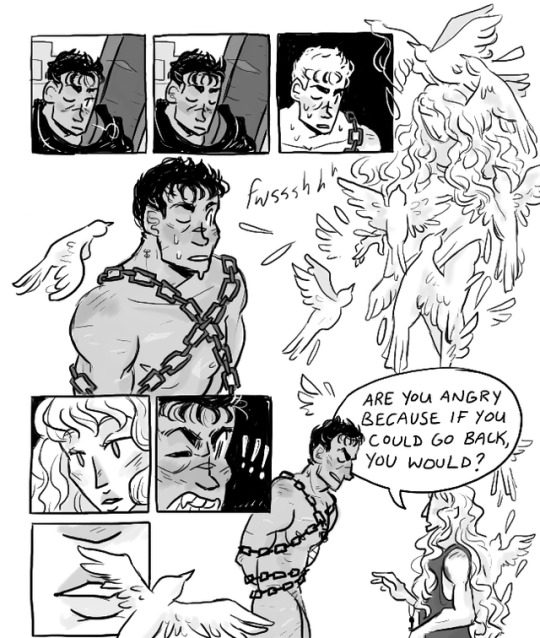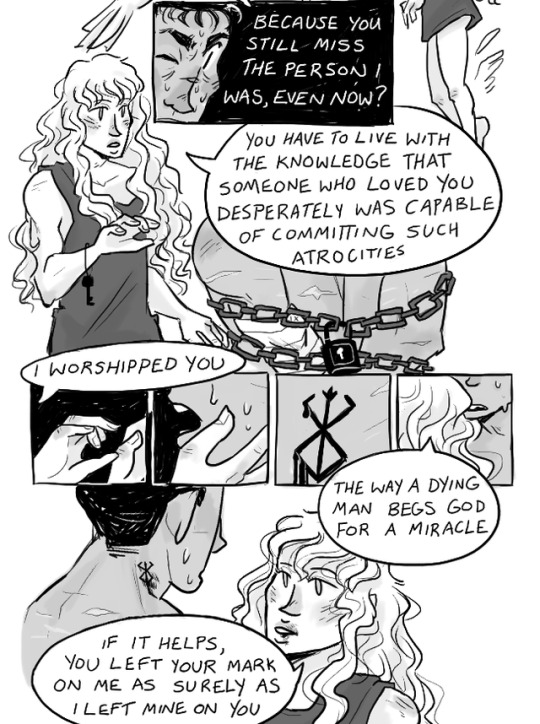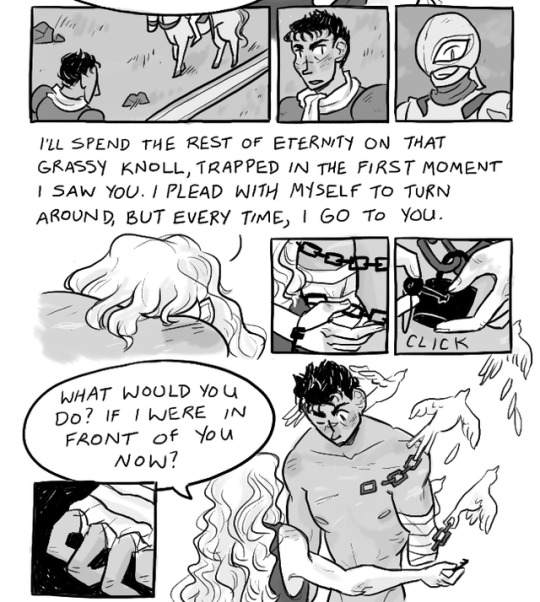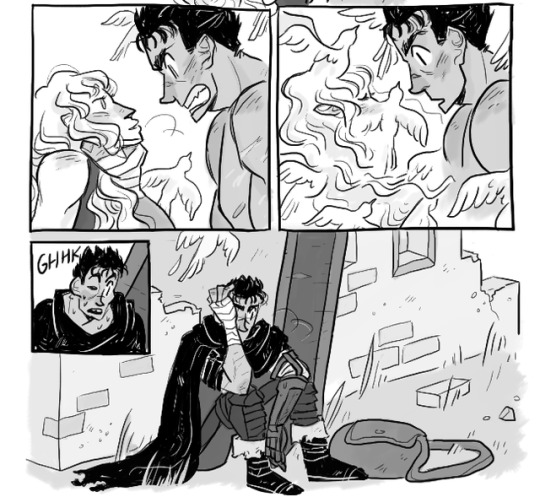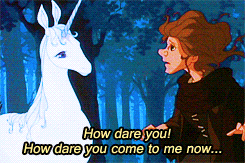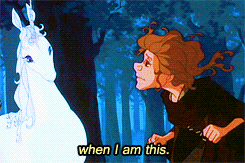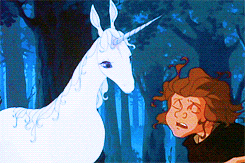lightadept
388 posts
Anime/manga blog where I fangirl and get heartbroken. My guilty pleasures are Saint Seiya / Rose of Versailles / Soukyuu no Fafner / Berserk. 29.
Don't wanna be here? Send us removal request.
Text

Milo and Camus 🔥🔥 ~ Saint Seiya
Art by @LHCLen / Twitter
88 notes
·
View notes
Text
OMG! It really takes eagle vision to spot a parallel like this! 😉



[not me finding Eagle x Lantis revealing parallels]
35 notes
·
View notes
Note
I only like Eagle x Lantis because Eagle likes Lantis. Otherwise, I'd totally be an Eagle x Geo Metro fan. 😆
Your Eagle post is perfect! I read the manga years ago but I still love the relationship between Eagle, Hikaru and Lantis. It never felt like a love triangle to me, but instead like Lantis fell for Hikaru because she is like Eagle.
Thank you! ^^ To be honest, I have no idea why the love triangle theory as an actual canon seems so popular in English-speaking fandom. Other fandoms mostly don’t see it that way. Lantis falling for Hikaru in the manga came out of the blue, but there are definite cues that he likes both of them. But he’s also the only one who goes both ways. And yes, there’s definitely some parallel running between Hikaru and Eagle in his eyes.
11 notes
·
View notes
Text

I’m having a serious case of Eagle’s profile obsession
22 notes
·
View notes
Text

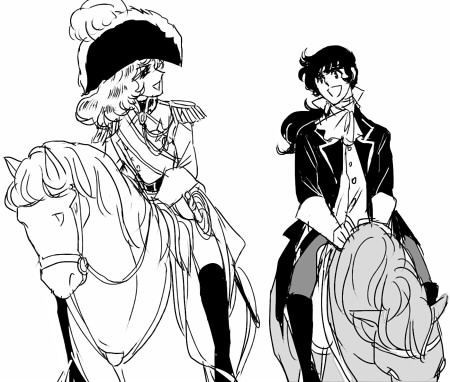
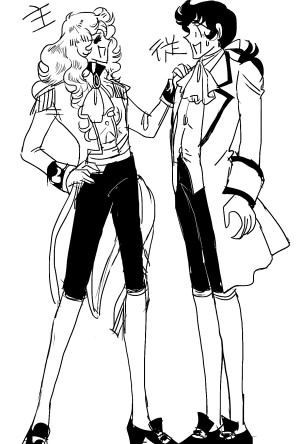
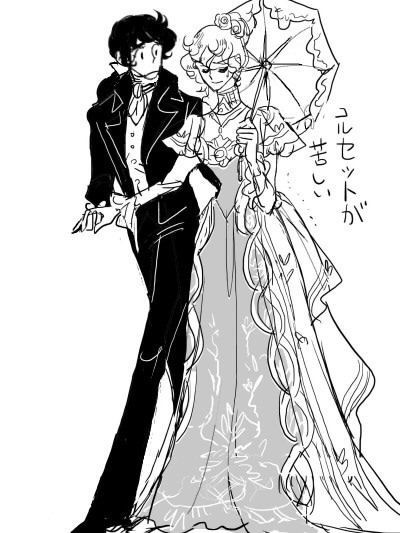
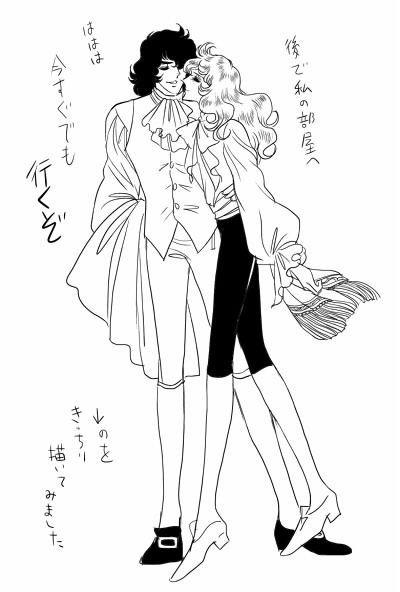
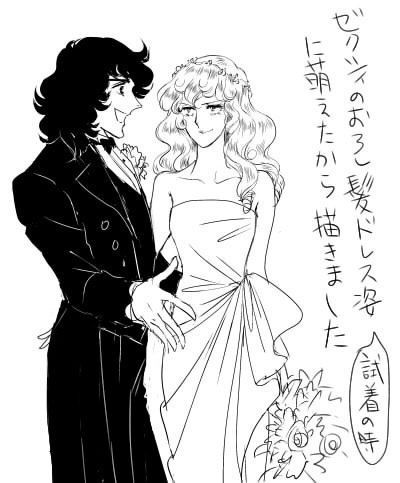

oscar & andré <3
636 notes
·
View notes
Text



The reward for ambition too great… is self destruction. — Berserk 1997
1K notes
·
View notes
Photo



The Lovers, Akseli Gallen-Kallela / Mutuality: CLAMP Works in Code Geass Ch. VIII, Ichiro Ohkouchi (trans. KazaeAkira, Be With You Scans) / Code Geass: Lelouch of the Rebellion R2 Ep. 25 “Re;” dir. Noriaki Akitaya, wr. Ichiro Ohkouchi
407 notes
·
View notes
Note
What are Apollo's roles as a chthonic deity?
Chthonic deities are the ones that live underworld, or beneath the earth, so Apollo is technically not a chthonic deity. But if you meant to ask for Apollo’s association with death, then there are some. Though, I think the prominent one would be Soranus, the Roman underworld deity, being replaced by Apollo and His cults (I’ll talk about that in the end since it’s explanation might a bit lengthy).
> Apollo is the God of tombs/cemeteries. He guards the souls in the tomb till the body decays and soul can be separated. Hermes is the god who conducts the souls to underworld, but Apollo separates the soul from the flesh. The Ionian tombs have inscriptions asking Apollo to guard the dead bodies and purify their souls.
> Apollo is the God of disease, and that’s his deadly side. He brings death to old and young alike (especially to the young boys). I know any God can bring death to a mortal if They wished, but it was under immediate care of Apollo and Artemis, and They were famously called as bringers of sudden deaths.
> Apollo is especially concerned with dead bodies and their proper burial. This can also be seen when He scolds the other Gods during Trojan war for letting Achilles drag Hector’s dead body. Apollo also protects the dead body by His magic. He is also the one to retrieve the dead body Sarpedon (a son of Zeus) from the battlefield.
> Apollo’s connection with decaying of dead bodies can also be taken from Apollo’s punishment to Python. Python means “rotter”, and the first ever punishment given by Apollo is rotting. His epithet, Pythios, also derives it’s origin from this feat of His.
> The cycle of life and death is a part of Apollo’s nature. His visit to Hyperborea brings winter to the world (and was considered as His “annual death” in Delphi.) He brought death to everything (vegetation especially)with His departure. With His return, new life would be generated. Through the summer and winter cycle He caused, Apollo was both the bringer of life and death.
> Apollo has “consumed” some Gods. I mean, Python was considered as an oracular deity so Apollo basically killed a deity and established His own cult there. And Python wasn’t the only one. Apollo also replaced Paean, an early Greek deity of healing (Paean is now only an epithet of Apollo). Hyacinthus was a pre-hellenic God as well, whose cults were consumed by cults of Apollo, or rather, both were merged and considered as one God - Apollo Hyacinthus. And the most interesting one - Soranus, a Roman underworld deity, was also subsumed by Apollo (Here He is called Apollo Soranus). Hence Apollo basically has taken over the chthonic responsibilities of the former deity - death and purification.
Keep reading
2K notes
·
View notes
Text
Finally my MKR artbook arrived! Here’s some interesting commentaries by Clamp

~My comment: we have learned by now that we must take the word “friends” by Clamp with a grain of salt.

~My comment: Eagle is canonically fully recovered ☺️ and he is spending time up in the trees with Lantis, back to back. Awww.

~My comment: *screaming my brain out*
Side note: I am trying to visualize their relationship in their daily life too, Clamp, be sure
70 notes
·
View notes
Text

My sweet cutie pie, don’t be sad, I can bring you to Italy, we have some pretty clear blue skies here as well
11 notes
·
View notes
Text
Eagle Vision, Hikaru and some very strange MKR symbolism
@aldebaranarfeiniel @theblueescapist Writing this hurt my brain. So, let’s dive in. This is how Cephiro looks.

It took me embarrassingly long to realize that Cephiro sounds like... Sefirot. Cephiro, as the very name suggests, is apparently based on Sefirot, a Kabbalistic tree of life, which is a system depicting the flow of macrocosmic and microcosmic life energy.

There is a flow of energy from top to bottom, from divine to material, and vice versa. This is another esoteric representation of the same thing:
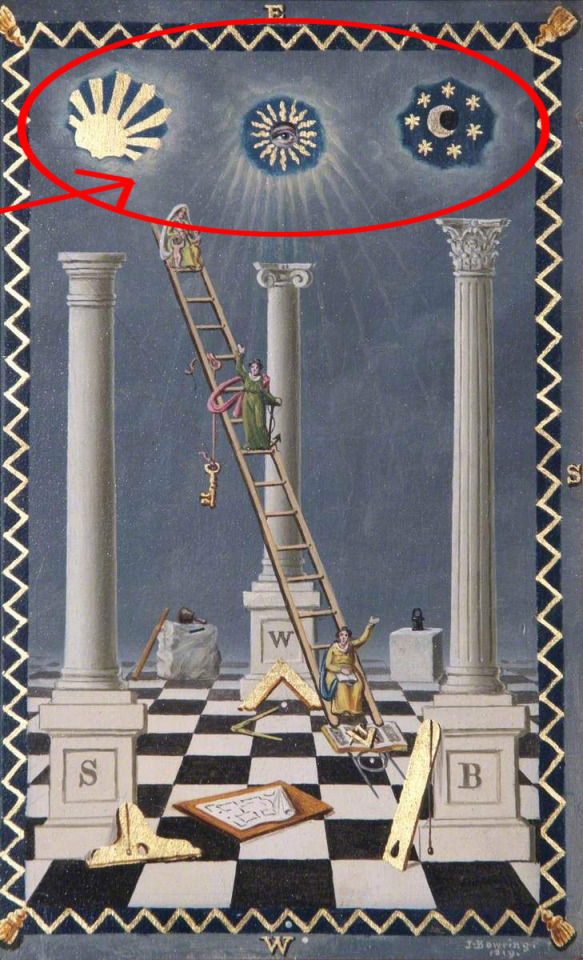
And here are our girls with the same symbols!
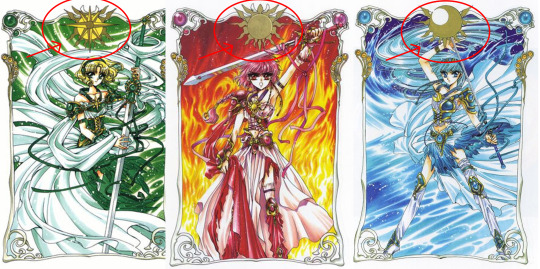
Fuu (Solar, masculine energy) Hikaru (Solar and Lunar, masculine and feminine energy combined) Umi (Lunar feminine energy) While the three pillars specifically are an Abrahamic esoteric symbol, the Kabbalistic tree of life as an energy flow system exists in numerous religions and beliefs, pagan and modern alike. One of them, which you all know because it’s all across popular culture, is of special interest to us.

Notice the eagle at the top (ethereal, divine, intellectual) and snake/scorpion (physical, instinctual, passionate) at the bottom! The most famous representation of this symbol is depicted in the zodiac sign of Scorpio, and its dual nature containing both scorpion and eagle.

Eagle Vision obviously stands for an eagle, but just look at Hikaru. Her braid looks like a scorpion.

The Eagle-Scorpion dual nature of the zodiac sign, once translated to its esoteric/Kabbalistic parallel, depicts the same energy flow that moves up and down those pillars and Sefirot, travelling between spiritual and material planes. Scorpion represents the lower nature, the physical, the body, the earth, the passion, the personal. Eagle is its higher manifestation, all things intellectual, sophisticated, unearthly, ethereal and collective. Scorpion needs the eagle to extend it upwards, to help it grow, to spiritualize it. Eagle, on the other side, needs the scorpion to earth it, to give a physical, mundane manifestation to something that is otherwise purely spiritual. In other words, they complete one another. Divine redeems material, material redeems divine. Most importantly, they are just different manifestations of the same thing!
In my headcanon, Eagle and Hikaru are really the same person - they are not just drawn to each other, they are each other. She is from Earth, and he is like her counterpart from the astral universe of Cephiro. They are both initially chosen to be pillars because they are just different ends of the same axis. She greatly admires him and looks up to him, wishing to be like him. He, on the other side, learns from her to exist. He elevates her, her self-esteem, her self-love. He brings out the higher in her. She in return teaches him precisely what scorpions symbolically teach eagles: to value personal happiness over blind, selfless sacrifice for sake of collective, greater good. Another interesting thing is Emeraude, and how she connects to these two. This is going to be a bit hardcore, but bear with me. In the following picture, she is situated between two pillars.

It’s a clear reference to this, High Priestess Tarot card:

The explanation of the symbolism is as follows:
You've most likely encountered the High Priestess before, but in other forms - she can be seen in the archetypes of Persephone, Artemis, Isis and many more. When you encounter her, you will see her sitting on a cubic stone between the two pillars at Solomon’s Temple, Jachin, and Boaz. Jachin (right) is generally referred to as the Pillar of Establishment and Boaz (left) is the Pillar of Strength. The pillars also depict the duality of nature; masculine and feminine, good and evil, negative and positive.
The High Priestess's location between the two suggests that it is her responsibility to serve as a mediator between the depths of the reality. She is the third pillar - the path between. She believes that both pillars are equal and there is knowledge to be learned in both worlds. You will also notice that she wears the crown of Isis which can mean that she is a believer of magic.”
So, the ideal pillar excludes neither physical nor divine, neither personal nor collective notions. This is where Emeraude fucks up big time. By going all self-sacrificial and giving up her personal happiness, the cosmic balance was disturbed.
Now take a look at this:
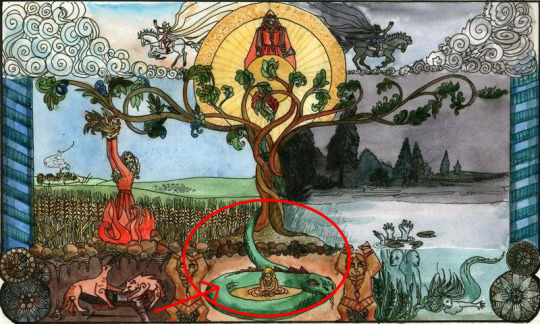
This is the Indo-European tree of life (again, a pagan counterpart of Sefirot system and those pillars). Configuration is always the same: eagle god at the top and snakes/scorpions at the bottom. But notice how there’s a captive girl at the base of the tree - just like Emeraude, who is a prisoner of the world tree. This is a very common motif in Indo-European mythology: there is a maiden, sometimes a divine pair, divine twins or primordial lovers, who are situated at the base of the world tree, the axis mundi, the cosmic pillar, awaiting redemption, sort of like Adam and Eve. They are respectively dormant masculine and feminine energies that need to be released from their latent, imprisoned nature. The girl would then symbolize dormant feminine energy that needs to be given a proper place in the hearts of people. As long as she is imprisoned and unredeemed, she is also absent from the hearts of people. Masculine energy symbolizes spiritual and collective qualities, feminine earthly and personal. This really fits with the theme of her selflessness and inability to put her own happiness in front of other people’s. Funnily enough, in Indo-European mythology, there are many folk songs that tell about this captive prisoner/maiden at the bottom who ritually calls forth an eagle from the top of the tree to descend and redeem them. (This is an incredibly interesting blend of Christian/Gnostic and pagan beliefs, as you are probably noticing redemption theme here).

This is just what Emeraude does. She calls forth these legendary warriors who are said to be able to redeem and free her from her tragic fate. But it’s not quite Eagle Vision who saves her as a new pillar, isn’t it? It’s Hikaru, an earthling. Remember, eagle is a symbol of spirituality, of selflessness, all higher qualities. Emeraude doesn’t need to learn selflessness, because that’s what got her in trouble in the first place - she needed to learn to value her personal feelings, to be selfish. That’s why she isn’t saved by Eagle who is equally selfless.
She is saved by Hikaru from physical realm (Earth). Here material redeems divine, not the other way round! Emeraude who is all divine, self-sacrifical and Christ-like is freed from imprisonment by Hikaru who basically teaches her through Eagle that, hey, it’s okay to be selfish, to want to be happy. So, magic knights are absolving her of her own self-denying divinity - which is a pretty darn cool theme. What’s interesting here is that both Hikaru and Eagle are like symbolic expressions or emanations of Emeraude’s tragic fate in a way. If Emeraude and Zagato symbolize that dormant, imprisoned energy, a love that was never properly consummated and given a place, then Hikaru, Eagle and Lantis are their extensions, their second chance. Lantis is Zagato. Hikaru and Eagle are both Emeraude. Hikaru is that fire and conviction that Emeraude should have had, and Eagle Vision is a resolution of her conflict - he is the Emeraude who finally learns not to self-sacrifice. I just fucking love to think of Eagle Vision as an expression or emanation of Emeraude. He is totally moved by her feminine energy.

#Eagle Vision#Hikaru Shidou#Magic Knight Rayearth#lantis#emeraude#cephiro#another weird meta#i got carried away#why do japanese love occultism so much???
83 notes
·
View notes
Text
Character Analysis: Mythological Relationship of Griffith and Guts

Whether intentionally or not, Guts and Griffith’s relationship seems to be heavily rooted in one particular mythological theme, which further colors their attraction and antagonism to one another. I’ll quickly go through the mythos in the first half of the post, and then discuss in the second half how it relates to their relationship and also to Casca. I apologize in advance for all the nonsense that’s going to come out of this. @bthump, here’s the analysis I promised to make a few weeks ago!
Proto-Indo-European mythology, whose traces are visible across cultures in entire Eurasia, shows a recurring conflict between two opposing principles. There’s a devouring chthonic creature on one side, a beast (most commonly, a snake or a wolf), and it’s associated with the lower world of matter. Then on the other side, there’s a hawk, a falcon, or an eagle: aerial, graceful, spiritual, and predatory, suggestive of celestial realms. Slavic mythology, which is an offshoot of Proto-Indo-European mythology, in particular, uses very often beast vs. hawk symbolism. In later dualistic interpretations, the spirit is good, the matter is vile, and the spirit triumphs over the matter. However, in older, naturalistic interpretations where this symbolism originated to begin with, spiritual and chthonic currents are eternally bound together, both necessary, both neutral, both caught in perpetual conflict. It could be that Berserk simply borrowed hawk/wolf dynamic from Ladyhawke (1985), however, Ladyhawke merely uses forms present in this myth, but not their underlying meaning. Berserk, on the other side, delved deep into it, and the driving force behind attraction and conflict of Griffith and Guts seems to have roots in it.
These two opposing mythical sides - hawk which stands for spirit, and beast which stands for matter - have different faces, different hypostases. Sometimes they are represented as archenemies always killing one another, sometimes as lovers always searching for each other, reflecting the idea that they cannot exist separated, yet almost whenever they combine, they inevitably hurt one another. Spirit suffers when it’s brought down to earth from its heights and entrapped in matter, and matter suffers when it is taken into the heights because it loses its roots, its relation to the chthonic earth. There’s always an imminent danger in combining them.
Mythologically, the joining of these two opposing principles is usually depicted as a marriage of sun and moon - which, especially in some later philosophies that were a continuation of the original mythical thought - is often depicted as an eclipse (Ladyhawke uses this theme too). It is a moment when the spiritual is touching upon the physical, and if the union is successful, a third element is produced out of the two, containing both and reconciling them. However, if something goes wrong during the union, the result is a disaster. Old Slavic lore is chock-full of folk tales and legends that describe this event. There’s an attempted marriage of two persons - who are always the respective echoes of the mythical beast and hawk gods, or to be more precise, of their children, who are not enemies like their parents, but instead in love with each other. In the myth, the god, who comes from the realm of the beasts, is traveling from depths to heights (matter is rising to meet the spirit) to meet his to-be-bride. And the goddess, who lives in the heights and comes from the realm of the hawks, is also starting to lower (spirit lowering to meet matter), and they are supposed to meet midway. Yeah, it’s the “I want to be his equal” thing. On her way down, things usually get super dirty. Their attempted wedding is immediately preceded or followed by a disaster, usually a massacre that leaves everyone present dead. This massacre is caused because, suddenly, instead of two lovers, we have three people involved. It’s usually one man torn between two women, one of whom is the bearer of the spiritual and the other of the material principle. Sometimes the person who massacres everyone is the jealous bride herself because she learns that there is “another woman”, and sometimes it’s the third person who doesn’t want to let the other two wed, usually a possessive mother. Metaphysically, what is happening here is that at the moment of conjunction, of spiritual and material realities trying to unite, that third element - which is supposed to be produced through their union - is already present. It’s a triangle now. Spirit, body, and soul are all present at once. Soul, which is always in the middle of the conflict, is being torn between spirit and matter, cleaving to them both, and as a result, someone always ends up being the third wheel. In other words: spirit and soul wed and unite, but they forget the body. Or body and soul unite, leaving the spirit out. This third left out element punishes the other two, having been left out, and everyone inevitably suffers. This legend is a fantastic psychological metaphor for the terrors that psyche undergoes when one of its aspects is suppressed and denied. This love triangle represents the body-soul-spirit dynamic, where the soul is torn between the other two. It’s an allegory on what happens when the soul chooses (or seems to choose) one side over the other, and then as a consequence and a punishment, matter castrates spirit, or spirit castrates matter. There are many variants of this legend across Slavic folklore. All of them always echo the original Proto-Indo-European mythological conflict, involving the spiritual hawk vs. chthonic beast god. Did Miura know about all this? I don’t think so. It seems very unlikely. But he didn’t need to. He maybe knew about beast vs. hawk mythological conflict, or he simply borrowed the symbolism from the Ladyhawke movie. However, this myth merely personifies the human conflict present in almost all religions or philosophies. This theme is everywhere but in some less recognizable forms. Everyone eventually feels that it’s difficult for a soul (or psyche in our modern language) to be grounded in both spiritual and physical matters. It’s either inclined more to the spirit, or more to the physical reality, and if one goes all introspective and muses on this, one will inevitably be caught in this unfortunate love triangle of spirit-soul-body, where something is always being excluded at the expense of something else. I see Guts in this as a soul, torn between Casca and Griffith, between earthly and ethereal. So, Miura probably simply repeated the same tragedy that has been told throughout centuries in all cultures. Not because he knew these myths, but because these myths are imminent conclusions personified. They are just echoes of the age-old humanity’s struggle to understand itself that’s already embedded in the human psyche. Now let’s look at Guts, Griffith, and Casca through the lens of this symbology. Those three are that tragic, messed up triangle of spirit, soul and body. Guts is the soul, which is in a way always the center of the triangle because everything is perceived through it. He has substance, depth, but not a place in the world. At the beginning of manga, Guts is broken to the very core: he is essentially a man without a purpose, roaming and wandering, scattered. He doesn’t feel any higher call, he has no personal agenda, no personal wishes - he just exists and does things without knowing why he does them. Moreover, he is not just spiritually starving but physically as well, scarred by the trauma of what Donovan did to him. So, both his body and spirit have been butchered early on, leaving him with connection to none. But then he meets Griffith. And for the first time, Guts is fixated on something, there’s finally meaning, a purpose. He has something to fight for, something beyond himself. Griffith. Finally, a higher call. Griffith very clearly personifies the spirit principle. He’s all mental, aerial, detached, calculating, not earthed. White-bluish appearance, pretty evocative of aerial heights. He follows a higher call, he is messianic, but like with all spirits, his “dream” is not earthed. It’s detached from matter, from physicality, from ordinary life. He sees none of this, none of it is genuinely important to him, nothing touches him - that is, until he meets Guts. Guts brings him down, he earths him for a moment, and for the first time, through his interaction with another being, he’s an actual human, he is involved. For the first time, he is personally caring about someone. He’s cared about things before, yes: about his fellow men, about the Hawks, but in a detached matter, from far away, from the top, in a way that doesn’t involve him. With Guts, he cares personally. Guts invades him psychically, he reaches him from the inside. This is a violation of spirit by the soul, something completely new and unfamiliar to Griffith, so impactful that he is utterly baffled and ultimately shattered by it. There’s always a danger when it comes to involving a spirit into human affairs. In the aforementioned myth, eagles were used as symbols of spirit not just because they are graceful, but because they are predatory and ferocious - meaning that there is an innate tendency to destroy matter, to kill what crawls on earth, to want to detach from it. Matter is not their territory, it baffles them. When they engage with matter, the impersonal heights are suddenly made intimate and personal. Detachment suddenly becomes attachment. This soul-spirit union, personified by Guts and Griffith’s relationship, where they both invade one another’s psyche, can either result in something beautifully sublime or something utterly disastrous. If Guts only realized that he already was Griffith’s equal, and if only Griffith realized that Guts never truly abandoned him, these two characters would have redeemed one another’s weaknesses. It was Guts who misunderstood it first, or at least first acted it out. Remember how in the legend the mythical characters were supposed to meet midway: one was supposed to climb up and the other to come down. There’s a saying in alchemical philosophy - which, by the way, is philosophically identical to these myths: earthly must be made spiritual, and spiritual must be made earthly, and only then the union can be successful. Curiously, Ladyhawke somehow also ended up using this theme, probably accidentally. So, there’s definitely something going on here. After Guts overhears Griffith’s conversation with Charlotte about what being an equal means to him, Guts starts to think too low of himself, not being worthy of Griffith, not worthy of these sudden spiritual heights. After defeating Griffith in a duel and walking away from him, Guts says how he thinks Griffith is above all this, how this abandonment shouldn’t bother him because it’s just one of the many pebbles on the road.
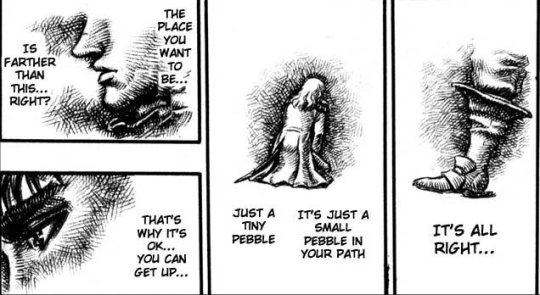
You’re a soaring spirit, so what the fuck are you doing with a petty soul like me? This scene is not just Guts abandoning Griffith. It’s the soul - stripped of confidence before a soaring spirit - abandoning it because it thinks it cannot catch up to it - although, in a way, it already did. That’s the tragedy. The soul wants so desperately to bond with the spirit, but it thinks it can’t. Guts thinks he will never be Griffith’s equal, at least not in his current condition. And then he abandons him. As a reaction, Griffith, the spirit, loses all ties to the one thing that earthed him, that plunged him into the realm of the personal, and made his spirit more humane: Guts, the soul. It’s really the ultimate irony that Guts never abandoned Griffith, or the heights and the meaning that Griffith came to embody for him. He was bloody loyal to it all along. But Griffith doesn’t know this. All he knows is the sudden sensation that he is being left behind. From his perspective, the spirit just got ditched by the soul, and right before Eclipse, the soul (Guts) chose body (Casca) over spirit (Griffith). That’s what Griffith sees.
Which brings us to Casca: the perfect tragic image of the body, of physicality. When she joins the Band of the Hawks, she abandons her womanhood in a way, she cuts off her hair, goes seemingly insensitive and brute. All these actions and traumas are representative of the terrors of having a body, and one’s responses to it, attempts to deny it because she was born a fragile woman in a cruel man’s world. On a positive side, it is Casca who saves Guts from his own physical trauma, who teaches him the ways of the body he long denied. It is Casca who provides a sense of belonging for a while, who gives him a taste of normal life. However, she only reaches a part of him. The other part responds to spirit only, to Griffith. For Guts, Casca was that fleeting semblance of a normal, earthly life that needs to be protected (I won’t go into whether this was out of genuine romantic love) and Griffith was that higher call, what set him aflame both intellectually and emotionally.
To me, the fact that Casca had to spend chapters and chapters in a mentally vegetative state, being reduced to a body without any substance, is absolutely genial. It’s kind of a sleeping beauty scenario in one of its atypical interpretations, where the protagonist - the principle of the body - sleeps throughout the whole story, while the soul (the prince) is out there fighting the dragons. The body is first to be destroyed, left behind when there’s a conflict of soul-spirit-body. It’s the first to take damage because it is the frailest of all three, because there’s an inherent tendency of spirit to hate the body as the body steals the soul from it. The soul can always dissociate from the body and exist in a somewhat detached state, where it can even bond with the spirit, but the body will always be dead and dormant without the soul. So, metaphysically, the concept of the body is perhaps the most tragic one. It always takes the blame for everything. Spirit is eternal, but the body is what limits the existence in space in time, and thus castrates the spirit.
Griffith’s rape of Casca could in a way be a reflection of this. In Griffith lingers a terrifying, dangerous interplay and clashing of body and spirit. He sold his body for his dream. He prioritizes ethereal over physical, the fate of the collective over fate of the individual. In his scenario, body entraps the infinite spirit in a finite, confined space, suffocating it. After sleeping with Charlotte, he personally experiences this in the dungeon where he was tortured and disfigured, by which his spirit was reduced to a rotting body. His disfiguration is the triumph of the material over spirit in him. Suddenly, he’s no longer a soaring hawk and his wings are cut off. It’s an outright spiritual fall for him, and he takes it terribly. In Greek mythology, mortal encounter with the divine is often represented as rape, madness or dismemberment (gosh, I fucking love Greeks for this) because it shatters the psyche. It terrorizes it. For Griffith, this mythical transition, the descent from ethereal to earthly was disastrous to his state of mind. When Griffith rapes Casca, it’s not just a revenge against Guts - it’s spirit raping the body, getting back at it, while the soul watches and suffers. Just previously in the dungeon, it was body that violated spirit in his case. It’s as if the rape of Casca parallels Griffith’s very own disfiguration, which is also a violation of sorts. By raping Casca, Griffith is essentially saying something like: I no longer need you, now I’m above you. Because he is so traumatized of terrors of losing Guts - meaning, losing soul - and as a consequence, being “reduced” to something earthly and trivial and ordinary (without Guts, nothing makes sense to him anymore), he needs to be free of it. Of both body and soul. He needs to be freed from his attachment to Guts and freed from this earthliness. When he becomes Femto, he’s finally pure of spirit, a god. Man, I hope it bites him in the ass. He needs to be brought down from his godly heights, and forced to experience the terrors of emotions he cut off. The revenge has to be full psychological.
#guts#berserk#griffith#gutsgriff#casca#griffguts#guts x griffith#eclipse#meta#what the fuck did i just write
305 notes
·
View notes
Note
Your Eagle post is perfect! I read the manga years ago but I still love the relationship between Eagle, Hikaru and Lantis. It never felt like a love triangle to me, but instead like Lantis fell for Hikaru because she is like Eagle.
Thank you! ^^ To be honest, I have no idea why the love triangle theory as an actual canon seems so popular in English-speaking fandom. Other fandoms mostly don’t see it that way. Lantis falling for Hikaru in the manga came out of the blue, but there are definite cues that he likes both of them. But he’s also the only one who goes both ways. And yes, there’s definitely some parallel running between Hikaru and Eagle in his eyes.
11 notes
·
View notes
Text
Some thoughts on Eagle, and his relationship to Hikaru and Lantis
Contains spoilers. Eagle. I fucking adore this guy. He is so insanely tragic, a cauldron of paradoxical feelings. He’s playful but tormented; strong, but at the same time gentle, breakable. All this is clashing so beautifully together. It’s his sadness and melancholy, mixed with charisma and audacity, that’s perhaps the most captivating. He’s on a suicidal mission, yet that doesn’t quench his love of life because it was all out of love to begin with. But there’s also a silent resignation to him, a very peculiar case of selflessness, and I’d like to look into this a bit.
Eagle loves Lantis profoundly, he’s head over heels in love with him - I think we can all agree on that. But he’s silent about it. All things he does for Lantis, all sacrifices he makes are selfless, they don’t include him. In fact, they exclude him. When Lantis is in mortal danger, exhausted Eagle says to him: “if you die, Hikaru will be saddened.” Pay close attention to this because this sentence is such a brilliant mind-fuck.
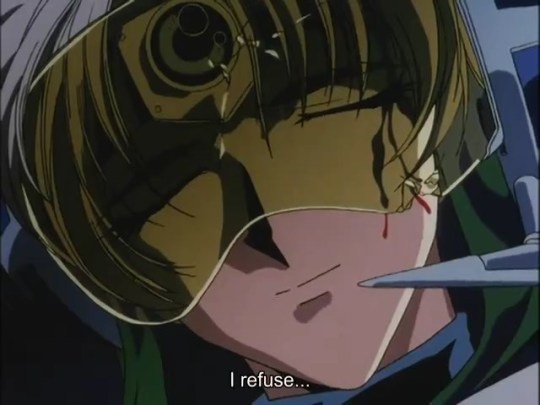

He doesn’t say “I”... he says “Hikaru.” He displaces his sense of self, his subjectivity, and puts it onto her because he is going to disappear anyway. It’s kind of him to think of others at this moment, but there’s more to this: when he says “Hikaru will be saddened”, along these lines lies hidden “I will be sad”.
His last words are similar: “Lantis... please make Hikaru happy.”
He’s being erased from the world, he’s losing a place in it, so he passes his will - and his will is love - onto Hikaru, so that she can give to Lantis what he couldn’t. In a way, he is extending himself through Hikaru, transferring a part of himself onto her. But at the same time, he’s selflessly exempting himself from their relationship, leaving the two alone.
Ahh, Eagle, you jerk!! You’re breaking our hearts!!
In manga, this issue is beautifully addressed:

Eagle’s fate is about to be the same like Emeraude’s. He takes on all the pain upon himself, but it’s Hikaru who ultimately sees that Eagle is putting aside his own happiness, just like Emeraude did. And she won’t have it (good job there, Hikaru).


The key word here is: for yourself. Just moments ago, Eagle was about to discard himself from existence so that Lantis could live. He was about to freeze the entire Cephiro along with himself by becoming a Pillar, while sending its inhabitants to live in Autozam, and this is the ultimate act of self-annihilation, a self he has been denying all along. Hikaru stops him from doing it, seeing Emeraude’s fate repeating in his - just like she gave a place to Nova to exist in her heart in anime, in manga she gave a place to Eagle in a world he was preparing to leave. This shocks him, because for the first time, someone is returning to him that self that’s been forgotten, denied to exist. Their relationship is beautiful because Hikaru reached his most recessed psychic abyss, and saved him from where he buried himself. He also helped her: to her, Eagle is a second Emeraude, and this time around, he’s a Pillar she managed to save. In a way, he redeemed her as well. That said, I don’t see these two as romantically attracted to each other, be it anime or manga. I don’t think Hikaru likes him in that way, nor does he like her romantically. Instead, they are more like one person, each reflecting the other, redeeming each other. Their mutual interaction is based on self-growth they both provoke in one another. In anime, Eagle encourages Hikaru all the time, he feeds her confidence and her love for Lantis, at his own exclusion, and he does it not only for Lantis but also for her. In manga, Hikaru has admiration for him, she says to Lantis that she would like to be like Eagle. Lantis says they are alike. They are not in love with each other, anime or manga-wise, however, manga!Lantis seems to be into both of them... Ehhh, it’s getting complicated.
#eagle vision#hikaru shidou#lantis#mkr#magic knight rayearth#eagle you jerk#you had me crying throughout entire anime#i don't remember the last time i cried over a character like this#eagle#hikaru#spoilers
54 notes
·
View notes
